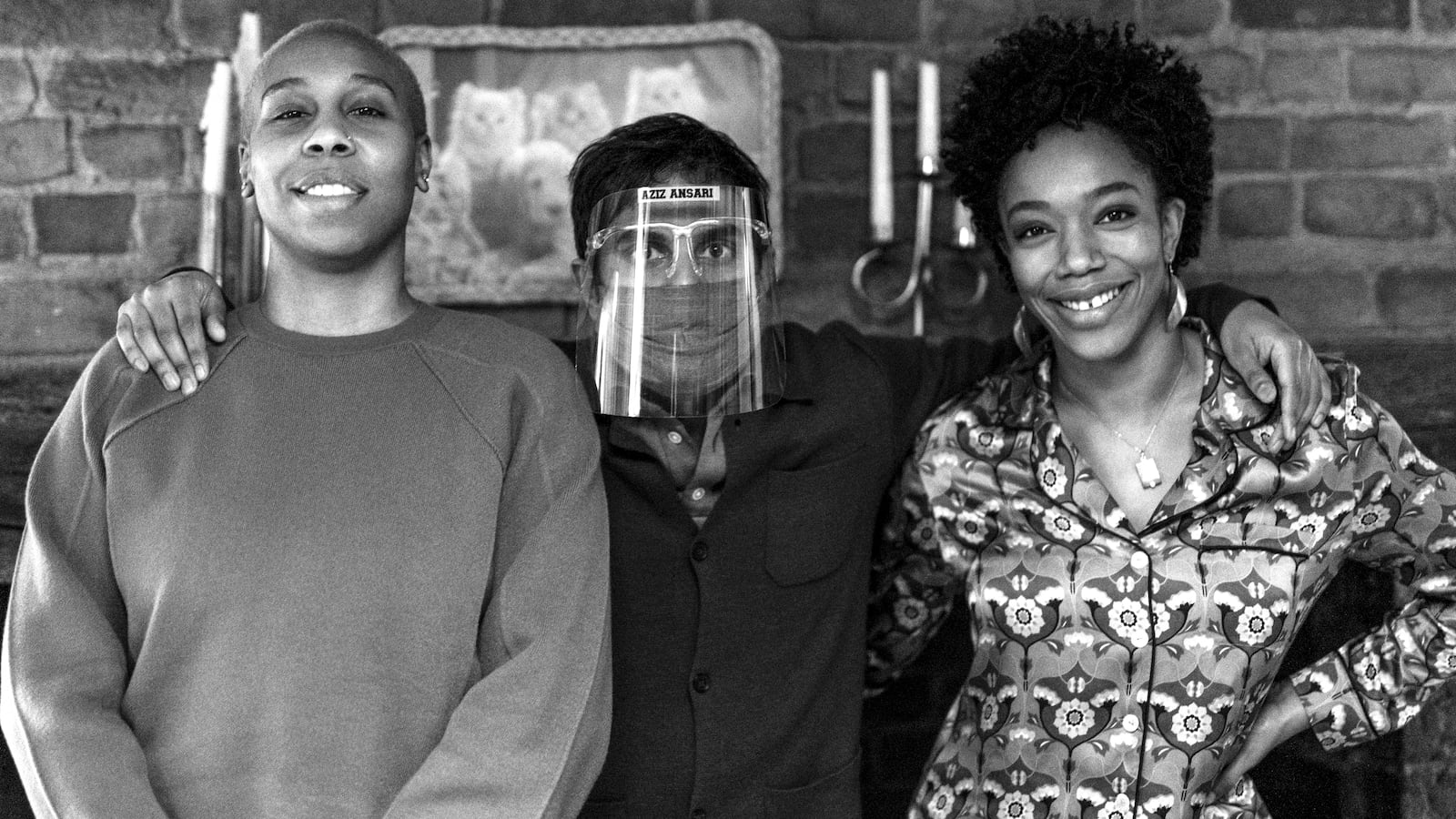It was only rational that after a widely publicized #MeToo scandal and a re-examining of Aziz Ansari’s comedic persona the return of his critically acclaimed Netflix show Master of None—whether or not viewers believed it needed to come back—would be completely revamped and almost unrecognizable.
Its belated third season, subtitled “Moments in Love” and premiering on May 23, shifts the series’ focus from its former protagonist Dev (Ansari), a mid-tier actor navigating love and showbiz in New York, to one of its beloved supporting characters, Dev’s best friend Denise (Lena Waithe) and her wife Alicia (Naomi Ackie). Master of None’s first two seasons, but particularly its second, took technical cues from Italian neorealism and the French New Wave and delighted in meandering subplots and vignettes featuring an assortment of intriguing side characters, including Denise who stars in its Emmy-winning “Thanksgiving” episode. “Moments in Love” trades that energetic storytelling for a static, grainy camera primarily set on its two subjects in their cozy countryside home, zeroing in on the most subtle parts of an already subtle story.
Whether or not fans of the show are eager to dive back into Ansari’s work (he’s the sole director and co-writer of every episode along with Lena Waithe), he makes an arguably wise and strategic choice to relieve his audience of dealing with his presence on screen for too long (his role is shortened to a cameo) and however his real-life transgressions might’ve been addressed through his analogue (or, maybe more appropriately, Bobby Cannavale’s character Jeff, who’s accused of sexual harassment in Season 2), had he and Waithe decided to venture into that territory.
Obligatory episodes of television tackling sexual misconduct in light of the #MeToo movement have proven to be hit or miss. In 2018, showrunner Matt Weiner received flak for a rather clumsy episode of his Amazon Prime anthology series The Romanoffs that was widely interpreted as a self-defense against a sexual harassment allegation made by a female staff writer on his previous show Mad Men. For Ansari, “Moments in Love” is mainly a chance to prove the weight of his four-year absence as an auteur at a time when many people have argued that the work of problematic men is never really that vital. But it’s harder than not to stake a claim in the television landscape in the age of streaming, let alone when you’ve nettled some of your audience.
That’s why it’s surprising how less ambitious “Moments in Love” is compared to previous seasons of Master Of None. Overall, the season feels more like a victory lap for Ansari (it might be for Waithe at this point) rather than a crucial opportunity to regain momentum in an industry that seems to move along fine without him.
It’s not that “Moments in Love” doesn’t have a promising or intriguing premise. Taking a page from Swedish filmmaker Ingmar Bergman’s book and his seminal miniseries Scenes from a Marriage, the season’s five episodes, ranging from 20 minutes to an hour, depict the day-to-day activities, mundane back-and-forth, and occasionally melodramatic moments that comprise Denise and Alicia’s outwardly idyllic domestic life. We watch long takes of the couple folding laundry while dancing to ’90s R&B, chatting over meals with friends, and having random middle-of-the-night conversations. It’s the kind of stripped-down, authentic treatment that Black and queer film lovers on social media have been demanding for themselves in light of the relationship-in-crisis genre slowly making a comeback—but often starring straight, white couples. What’s missing from this refreshing approach is the signature curiosity and keen observational humor applied to Dev and other characters’ romantic lives in previous seasons that made all of the coffee talk and supplementary bits interesting to watch and, most importantly, funny.

There’s nothing particularly extraordinary about Denise and Alicia’s infatuation with each other, which, in many stories like this, is fertile ground for finding nuance and revealing layers where there don’t seem to be any. On the surface, they’re depicted as two intelligent, attractive people who enjoy art, being playful, and living a sumptuous life. Denise has moved on from writing in magazines to becoming a New York Times bestselling author. And Alicia is an aspiring interior designer working at an antique shop. The casual dialogue they share isn’t as characteristically witty as previous writing on the show. And we don’t really sense the toxicity in their relationship until it’s explicitly relayed to us by Alicia, who feels like she’s the primary giver between the two. Despite how languid the pacing of the episodes are, the scripts hardly spend any time probing or reflecting on the source of their conflicts or how they reached the point of no return.
For example, there’s a scene in episode three when Denise asks why cheating is grounds for separation. In an earlier episode of Master Of None, I could imagine Ansari and the rest of the show’s writers using this inquiry as a springboard for a discussion about monogamy and what we’re socially taught to consider acceptable and unacceptable in relationships. But the messiest parts of their marriage are quickly wrapped up in an oddly tidy manner that feels like Ansari and Waithe becoming bored with the relationship they’ve spent so much time indulging in.
The episode that feels the most deft in its examination of love and is certainly the season’s standout is actually about Alicia’s life apart from Denise as she attempts to get pregnant through in vitro fertilization, primarily because of Ackie’s stellar performance that oscillates from hopeful to emotionally drained to self-possessed to anxious as the medical process takes a number of nail-biting turns, while also examining the brief but intense bonds she forms with her nurses and doctors that happen to be far more engaging than the previous two hours of footage we have of her and Denise. This episode also does a great job of revealing the specific financial hardships of undergoing in vitro as a queer woman with regard to insurance coverage.
Overall, a season that seems keen on depicting the major heartbreaks and disappointments in life would benefit from exploring more of the grieving process and regret as a general theme. Coincidentally, Dev’s character who’s living with his parents, in an unhealthy relationship, and struggling to book acting gigs conveys this reality the few times he appears on screen. He tells Denise after a dinner that he “didn’t realize how good [he] had it.” It’s easy to interpret this statement—and Dev’s current predicament—as an illustration of Ansari’s career despite not receiving any material consequences for his alleged behavior that we know of save a change in his public perception. Unfortunately, “Moments in Love’s” final episode backs out of what these melancholic aspects of life mean for the women whose tumultuous journeys we’ve been following in favor of something a lot less interesting.



